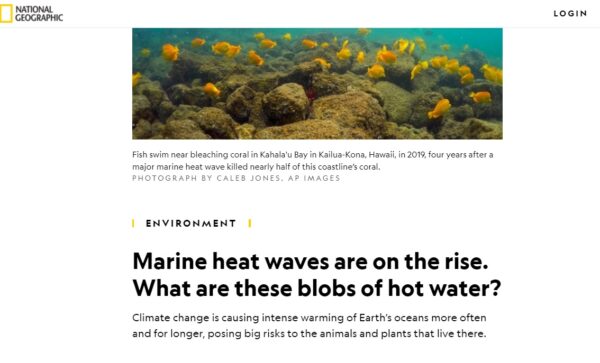今回の世界の海ザッピングはNational Geographicの記事からの投稿です。

今回の記事は海の温度が上昇しているのは知られているところですが、その他にもMarine Heat Wave(海の熱の波=Blob)が発生しているという話題。
この熱波ならぬ熱波(ここでは英語名のBlob(ブロブ)をそのまま使います)が発生しているとのこと。それも海水温上昇は全体的に水温が上がっているのですが、このブロブは局所的にそれも海水温が華氏5度、高いところでは華氏7度も極端に上がっているとのこと。
この急激な温度の上昇による影響は、プランクトンなどの小さな生物がダメージを受けて大量に死んでしまうだけではないのです。
そのプランクトンを食べる生物の数も時間差で減っていったり、プランクトンがないので他の生物を捕食しようとして、他の生き物も数が激減したり。
生物が捕食のために他の地域に行かないといけなくなり、行った先の生態系の生物がまた変わってしまったりと、日本風に言うと芋づる式に影響が出てきてしまうのです。
いろんな所で環境の変化が起こっています。
皆さんに少しでも知ってもらい、アンテナを張っていてもらいたいです。
そして、これから自分たちがどうすればより良い未来を描いていけるのかの参考になればと思います。
原文のURLを下記に記載しておきますね。
https://www.nationalgeographic.com/environment/article/marine-heat-waves-are-on-the-rise-what-are-these-blobs-of-hot-water
==========================
Marine heat waves are on the rise. What are these blobs of hot water?
Climate change is causing intense warming of Earth’s oceans more often and for longer, posing big risks to the animals and plants that live there.
The water began warming in the Gulf of Alaska in late 2013. Within a few months, sea surface temperatures had increased by an average of 5 degrees Fahrenheit, and in places by as much as 7°F. Initially affecting an area of ocean approximately 500 miles across and 300 feet deep, by mid-2014 it had more than doubled in size before ultimately stretching 2,000 miles from Alaska to Mexico. Scientists called it the blob, an example of a phenomenon known as marine heat waves, and over the course of three years it turned the North Pacific ecosystem inside out and upside down.
Plankton and krill numbers crashed. Numbers of Pacific cod off Alaska diminished,= before ultimately the population collapsed. Starving sea lions washed ashore in their thousands, and massive numbers of seabirds died. Without krill to eat, humpback whales turned to anchovy, in search of which they swam closer to shore and became entangled in fishing gear. Humpback whale births also fell 75 percent in the subsequent six years. Toxic algal blooms shuttered crab fisheries. The food web shifted from one supported by tiny crustaceans to one dominated by nutritionally-poor gelatinous organisms called pyrosomes that had never been recorded so far north.
Marine heat waves are defined as sharp spikes of anomalously warm temperature that last at least five days, although many persist for weeks or months. Fueled by climate change-caused ocean warming they can impact marine ecosystems for years after the water has cooled again. As the effects of climate change become increasingly embedded around the world, marine heat waves are increasing in frequency and intensity—posing, says oceanographer Hillary Scannell, “a very big concern” for ocean environments.
==========================

